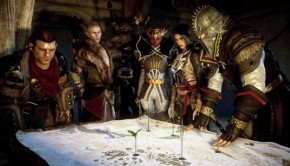The Stanley Parable: Design is the Law
 “Games are about feeling powerful and about you getting your way.” That’s how Leigh Alexander’s Grand Theft Auto V review satirized a culture that actively refuses to consider games critically and aggressively attacks anyone trying to talk about them as anything more than time-wasting escapes. This head-in-the-sand, who-can-shout-loudest mentality is the end result of a cycle that’s been spiraling out of control for years.
“Games are about feeling powerful and about you getting your way.” That’s how Leigh Alexander’s Grand Theft Auto V review satirized a culture that actively refuses to consider games critically and aggressively attacks anyone trying to talk about them as anything more than time-wasting escapes. This head-in-the-sand, who-can-shout-loudest mentality is the end result of a cycle that’s been spiraling out of control for years.
Publishers spend tens of millions of dollars creating AAA games that must be blockbusters or the entire company will go under. Developer compensation has become shackled to aggregate Metacritic scores. Reviewers, under extraordinary pressure from all sides, have slowly shaved more and more points off the bottom of their functional scale, until everything under 8.5 has fallen into the abyss, and every game has to be crammed into the point and a half remaining. Gamers, fueled by the hype machine and desperate to justify their hype, have become increasingly virulent in their attacks on anyone who goes off script. Think on this: in 1991, SNES classic Final Fantasy IV received Electronic Gaming Monthly’s prestigious Editor’s Choice Silver Award and Game of the Month with a score of 32/40, or 8.0. These days, that score would be a firing offense. That you might ask “For whom?” only reinforces how bad the situation has become.
 So that’s the industry party line, parroted by all strata: games are escapism, nothing more, and no one should care to look behind the curtain. Who knows what might be there? So the rough edges are all smoothed out, high-res textures and shaders spackle over gameplay deficiencies, and forward momentum never, ever stops. Player choice means expensive assets that might not even be seen, so choice is removed or reduced to insignificance. Player freedom means confusion and dissatisfaction, so the UI, gameplay, and level design all conspire to ensure the player never gets lost. Modern games are sometimes described as a rollercoaster, but that’s not quite right – a roller coaster goes up and down. Games are only allowed to go up. Down is boring! Down didn’t focus test well. Down might affect the Metacritic score. Have you considered up?
So that’s the industry party line, parroted by all strata: games are escapism, nothing more, and no one should care to look behind the curtain. Who knows what might be there? So the rough edges are all smoothed out, high-res textures and shaders spackle over gameplay deficiencies, and forward momentum never, ever stops. Player choice means expensive assets that might not even be seen, so choice is removed or reduced to insignificance. Player freedom means confusion and dissatisfaction, so the UI, gameplay, and level design all conspire to ensure the player never gets lost. Modern games are sometimes described as a rollercoaster, but that’s not quite right – a roller coaster goes up and down. Games are only allowed to go up. Down is boring! Down didn’t focus test well. Down might affect the Metacritic score. Have you considered up?
This trend isn’t just safe or boring. It’s much, much worse. And The Stanley Parable wants to explain why.
 The Stanley Parable is a short interactive adventure about a man named Stanley who works in an office. A machine tells him to push buttons, and Stanley pushes them. But one day, the instructions stop coming, and Stanley’s coworkers have all disappeared. Stanley stands up from his desk and sets off to discover what has happened…
The Stanley Parable is a short interactive adventure about a man named Stanley who works in an office. A machine tells him to push buttons, and Stanley pushes them. But one day, the instructions stop coming, and Stanley’s coworkers have all disappeared. Stanley stands up from his desk and sets off to discover what has happened…
It’s difficult to talk about The Stanley Parable responsibly as much, if not all, of its effect comes from forcing the player to challenge the unknown. The warm joy of discovery, the electric shock of an unexpected joke, the existential dread of not knowing what, if anything, lies around the next corner – all of these emotions depend on the player being unable to predict what will happen next. The developers themselves recognize the importance of uncertainty and have crafted a representative 30-minute demo entirely of content not in the final game. You should play this demo. It’s free, and you’re worth it.
 The Stanley Parable is well-crafted, with level design far beyond its original roots as a Half-Life 2 mod, and a once-in-a-lifetime find in Narrator Kevan Brighting. Brighting’s sardonic, wryly affected line delivery is the not-so-secret glue that anchors the entire experience. The Stanley Parable is very funny, but luxuriates in a deeply black, absurdist humor like Brass Eye or Douglas Adams. Though not horror, The Stanley Parable is one of the scariest games I’ve ever played, bringing to mind David Lynch’s Mulholland Drive or the reality-shifting of Jacob’s Ladder, both films that drag nightmares out from the shadows and into broad daylight. The Stanley Parable thrives on constant unpredictability in a medium that normally demands certainty. The game doesn’t just traffic in plot twists – it’s built from nothing but.
The Stanley Parable is well-crafted, with level design far beyond its original roots as a Half-Life 2 mod, and a once-in-a-lifetime find in Narrator Kevan Brighting. Brighting’s sardonic, wryly affected line delivery is the not-so-secret glue that anchors the entire experience. The Stanley Parable is very funny, but luxuriates in a deeply black, absurdist humor like Brass Eye or Douglas Adams. Though not horror, The Stanley Parable is one of the scariest games I’ve ever played, bringing to mind David Lynch’s Mulholland Drive or the reality-shifting of Jacob’s Ladder, both films that drag nightmares out from the shadows and into broad daylight. The Stanley Parable thrives on constant unpredictability in a medium that normally demands certainty. The game doesn’t just traffic in plot twists – it’s built from nothing but.
It may be tempting to dismiss the game’s structure as an extended parlor trick, the narrative equivalent of meat-grinder platformers like I Wanna Be the Guy or Super Meat Boy. And it’s possible to view the way it deploys and dissects standard gameplay tropes as a meta-game of “spot the reference.” If that’s all The Stanley Parable aspired to, it would be little more than an interactive Family Guy episode, quick-cut and shallow. But the title clearly communicates the designers’ intent: this game is a parable, a short, instructive story designed to impart a moral or spiritual lesson. “Moral.” “Spiritual.” The Stanley Parable is locked in a struggle to define the soul of gaming. It’s not just trying to blow your mind, it’s trying to rebuild it.
 The Stanley Parable asks: who’s in control, the player or the designer? Can the player ever be “in control” in a world of someone else’s design? Does the designer have a responsibility to abdicate control to the player? Who’s really in charge here? And who should be?
The Stanley Parable asks: who’s in control, the player or the designer? Can the player ever be “in control” in a world of someone else’s design? Does the designer have a responsibility to abdicate control to the player? Who’s really in charge here? And who should be?
The Stanley Parable is a fundamentally absurdist, existential fable. Absurdism is concerned with the gap between people’s desire to find meaning in life, and their inability to find any. The Stanley Parable is concerned with gamers’ desire to find meaning in video games… and their inability to find any. Existentialism is concerned with what authentically defines a person – what makes them uniquely themselves. A person defines their existence through their desires and actions, and the closer these things mirror their true self, the more authentic their existence. It is the things that only you can think and do that make you who you are.
 In existentialist author Kafka’s novel The Castle, the protagonist K. attempts to gain an audience with the bureaucrats who live inside a mysterious castle. The bureaucracy thwarts him at every turn, and he never does. In Kafka’s The Trial, the protagonist is arraigned on inspecific legal charges. Despite months and years of desperate attempts to learn his charges, he never does. The Stanley Parable includes an achievement titled “Unachievable,” with the description, “It is impossible to get this achievement.” It’s hard to imagine a stronger statement of absurdist intent.
In existentialist author Kafka’s novel The Castle, the protagonist K. attempts to gain an audience with the bureaucrats who live inside a mysterious castle. The bureaucracy thwarts him at every turn, and he never does. In Kafka’s The Trial, the protagonist is arraigned on inspecific legal charges. Despite months and years of desperate attempts to learn his charges, he never does. The Stanley Parable includes an achievement titled “Unachievable,” with the description, “It is impossible to get this achievement.” It’s hard to imagine a stronger statement of absurdist intent.
Kafka’s famous parable Before the Law, taken from The Trial, describes a man who spends his life waiting in front of a guarded door, hoping to gain admittance to the Law. He attempts to bribe his way past the gatekeeper, but to no avail. At the end of his life, he asks the gatekeeper why no one else has come in all these years. The gatekeeper replies, “No one else could ever be admitted here, since this gate was made only for you. I am now going to shut it.” There are many interpretations of this cryptic story, but I always return to the gatekeeper’s proclamation that “this gate was made only for you.” The man failed to reach the Law, but his failure was his own. He is denied the Law, but he is not denied his existence. He chose to stay before the door, and even in failure, that choice still defines him.
 The Stanley Parable is obsessed with choice and the meaning of choice. Sid Meier famously defined a good game as “a series of interesting choices.” When modern game design has removed all possibility of authentic, meaningful, interesting choice from the player, what is left? A bad game, or no game at all? If a person, a player, can only define themselves through making authentic choices, what happens when those choices are denied them? Quite frankly, they cease to exist. Non-existence… what better way to describe the ghostly, ethereal feeling of “playing” a game that practically plays itself?
The Stanley Parable is obsessed with choice and the meaning of choice. Sid Meier famously defined a good game as “a series of interesting choices.” When modern game design has removed all possibility of authentic, meaningful, interesting choice from the player, what is left? A bad game, or no game at all? If a person, a player, can only define themselves through making authentic choices, what happens when those choices are denied them? Quite frankly, they cease to exist. Non-existence… what better way to describe the ghostly, ethereal feeling of “playing” a game that practically plays itself?
 Modern linear museum games like Bioshock Infinite, Call of Duty, and Beyond: Two Souls have an antagonistic relationship with their players. They are, for want of a better word, resentful. Things would be so much easier if only the player weren’t there to foul things up. The player can’t be trusted to get it right, and control must be wrested away at key moments. Choices made by the player should be ignored and discounted wherever possible. The Stanley Parable argues that these games are not just safe or boring, but immoral. By removing choice, their designers have negated the player’s existence; by playing these games, the player negates their own. When you play a game that offers only inauthentic interaction, you aren’t just wasting your time – you’re diminishing your life.
Modern linear museum games like Bioshock Infinite, Call of Duty, and Beyond: Two Souls have an antagonistic relationship with their players. They are, for want of a better word, resentful. Things would be so much easier if only the player weren’t there to foul things up. The player can’t be trusted to get it right, and control must be wrested away at key moments. Choices made by the player should be ignored and discounted wherever possible. The Stanley Parable argues that these games are not just safe or boring, but immoral. By removing choice, their designers have negated the player’s existence; by playing these games, the player negates their own. When you play a game that offers only inauthentic interaction, you aren’t just wasting your time – you’re diminishing your life.
 It’s a strong message, and a sobering one. The Stanley Parable’s barbs are sharp but pointed, and new sections in this version add nuance to its message, acknowledging that not all modern games fall into this destructive trap, and there are still lights to be found in the darkness. But the hard truth remains that gaming has lost its way, and an entire industry perpetuates the fiction that big-budget player-negating titles are healthy and sane. They’re not. The lesson of The Stanley Parable is that these games are not an escape at all. They are a prison.
It’s a strong message, and a sobering one. The Stanley Parable’s barbs are sharp but pointed, and new sections in this version add nuance to its message, acknowledging that not all modern games fall into this destructive trap, and there are still lights to be found in the darkness. But the hard truth remains that gaming has lost its way, and an entire industry perpetuates the fiction that big-budget player-negating titles are healthy and sane. They’re not. The lesson of The Stanley Parable is that these games are not an escape at all. They are a prison.
5 Responses to The Stanley Parable: Design is the Law
Leave a Reply
You must be logged in to post a comment.











This review convinced me to play this game, and I wouldn’t have otherwise. Will download when I get home.
I can tell the author put a lot of thought into that article, but I found it to be mostly self-indulgent. He spends so long talking up a game by attempting to contrast its greatness with other recent games’ failures. But when he says that gaming has somehow lost its way because it has removed choice from the equation (and thus spackled over it with pretty pictures), he needs to revisit his thesis. The entire industry was popularized by platform games in the early 80’s which arguably have less gameplay choice than virtually any other genre. I’ll concede that it’s an unusual (and possibly thought provoking) game, but I think that’s where I have to draw the line.
My thoughts exactly. It’s not as if deep, meaningful games were the starting point for the industry unless you think Dig-Dug was philosophical greatness. In fact, I’d argue that this generation of gaming explores the meaning of choice and ethics more than any other generation has. Does it do it well and consistently? No, not really. The medium has a long way to go before it utilizes its full potential as a way to explore human nature and art, and that may be part of what The Stanley Parable was talking about. But I doubt it was bemoaning the change in video games from meaningful experiences to shallow ones. Video games have always been, for the most part, escapism. It’s just a bigger and easier to access industry now and thus, more of a concern for the larger culture.
I’m not a gamer, though I feel like a should be. I’m nerdy, I like computers, mathematics, science fiction… but most video game are boring to me. I Have enjoyed Minecraft and some of Portal … I want MORE I want more games for people like me.
So, to me, it seemed like there was a good point being made since he explained just why I have never been able to get lost in most “roller coaster” like games. I feel kind of trapped … It was satisfying to hear this articulated since I’ve never been able to put my finger on the problem.
I guess I’ll check out that demo he mentioned. I think he made a good case for it!
If games need to provide such choices to be good, doesn’t that rule out stuff like Dys4ia? Practically the entirety of the adventure game genre, too.